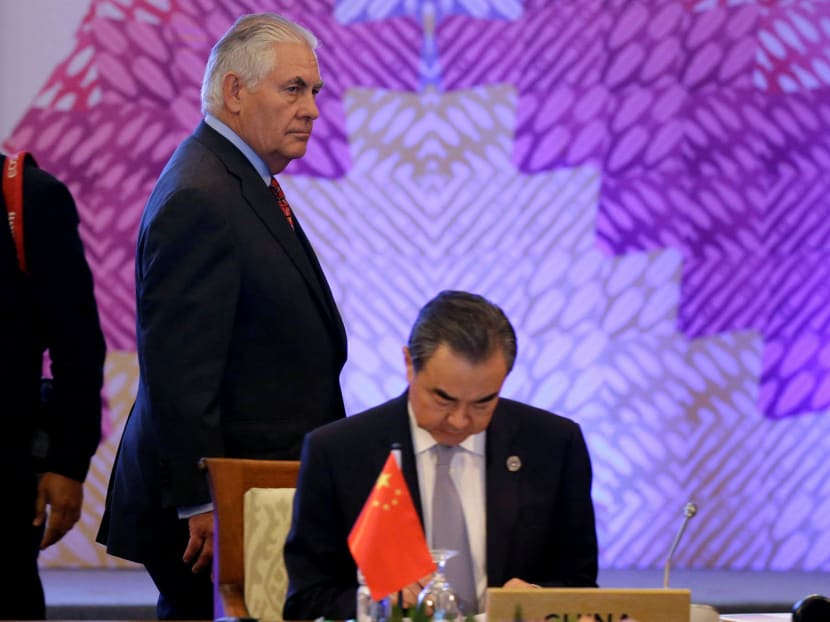Japan, US, Australia demand binding code on S China Sea
MANILA — The foreign ministers of Japan, the United States and Australia yesterday lambasted Beijing’s military build-up in the South China Sea and urged South-east Asia and China to ensure that the code of conduct they have committed to drawing up will be legally binding.

US Secretary of State Rex Tillerson (left) and Chinese Foreign Minister Wang Yi at the 7th East Asia Summit Foreign Ministers’ Meeting. Mr Tillerson and others blasted China’s military build-up in the South China Sea. Photo: Reuters
MANILA — The foreign ministers of Japan, the United States and Australia yesterday lambasted Beijing’s military build-up in the South China Sea and urged South-east Asia and China to ensure that the code of conduct they have committed to drawing up will be legally binding.
The Association of South-east Asian Nations (Asean) and China should establish a set of rules that are “legally binding, meaningful, effective, and consistent with international law,” the three allies’ top diplomats said in a statement following a meeting in Manila.
They “voiced their strong opposition to coercive unilateral actions that could alter the status quo and increase tensions,” the statement said.
They also urged claimants of the strategic waterway to refrain from “militarisation of disputed features” — in a veiled reference to China’s expansion of its defence capabilities on Mischief, Fiery Cross and Subi reefs in the Spratly archipelago.
Japanese Foreign Minister Taro Kono, US Secretary of State Rex Tillerson and Australian Foreign Minister Julie Bishop, who gathered on the sidelines of a series of regional meetings hosted by Asean, further asked China to “abide by” the July 2016 ruling issued by an international arbitration court in The Hague that rejected Beijing’s sweeping claims in the waters. China has ignored the court decision. Brunei, Malaysia, the Philippines, Taiwan and Vietnam have competing claims there.
Japan, Australia and the US are not claimants but have long been vocal on the issue, arguing their interest is in ensuring freedom of navigation and overflight.
They issued a similar joint statement in July last year urging China not to construct military outposts and reclaim land in the disputed South China Sea, drawing a sharp rebuke from Chinese Foreign Minister Wang Yi, who criticised the three countries for “fanning the flames” of regional tension just as countries have agreed that the situation needed to cool down.
Mr Wang said yesterday there is a “sharp contrast” in perceptions this year on the situation in the South China Sea between regional and non-regional countries, and the statement by Japan, the US and Australia showed that.
Countries in the region had “fully recognised the progress we have made through concerted efforts from all parties”, he said. “On the other hand, some non-regional countries remain in the past ... They are not recognising the positive changes occurring in the South China Sea. Is it that some countries do not want to see greater stability in the South China Sea?” he asked.
Foreign ministers of Asean and China on Sunday adopted a negotiating framework for a code of conduct, a move they hailed as progress but seen by critics as a tactic to buy China time to consolidate its maritime power.
Mr Wang said on Sunday said that formal negotiations could start this year, depending on whether the situation was stable, and if there was no “major interference” from outsiders.
Several Asean countries want the code to be legally binding, enforceable and have a dispute resolution mechanism, but experts say China will not allow that, and Asean may end up acquiescing to what amounts to a gentlemen’s agreement.
Minister for Foreign Affairs Vivian Balakrishnan said it was premature to prejudge the outcome of the negotiations.
“One key issue is the question of legally binding,” he told reporters late on Sunday. “Surely when we move into the COC (code of conduct), it has got to have some additional or significant legal effect.” Philippine Foreign Secretary Alan Peter Cayetano said he preferred a legally binding agreement, which other countries, like Vietnam, supported. AGENCIES






